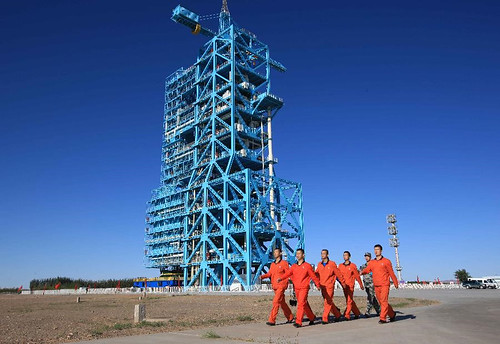China’s “Heavenly Lab”

动画演示“天宫一号”发射全过程
China’s Tiangong-1 is set to launch into low-earth orbit today, with the hopes of some day building a space station to rival the ISS.
Do they have a plan to dominate space? Not really. Dr. Morris Jones of Australia explains all in Space Daily…
This module is a small space laboratory with a single docking port. It is not the first module of a large Chinese space station, as some media reports are saying.
Tiangong 1 will test some of the technologies that will be used to build a large Chinese space station in the future, but it is not even a prototype of the modules that will be used to build the station.
Tiangong 1 will be used as a rendezvous and docking target for the unmanned Shenzhou 8 spacecraft, which will launch before the end of this year. China has never docked two spacecraft before. Shenzhou 8 will stay docked with Tiangong 1 for about three weeks, and will then send its descent module to a soft landing back on Earth.
If all has gone well with this flight, we can expect Shenzhou 9 to fly to Tiangong 1 in 2012, this time with astronauts aboard. They will live aboard the laboratory and their docked Shenzhou spacecraft for a short mission, then come home. Later in 2012, the Shenzhou 10 mission will also fly to Tiangong 1, delivering its second (and probably final) crew.
At this stage, we don’t know how many astronauts will be aboard Shenzhou 9 or 10. A maximum of three crewmembers can fly aboard one of these spacecraft. It’s possible that there will be two or three astronauts on these expeditions. At least one of the missions is expected to carry China’s first female astronaut.
Tiangong 1 is a vital step in China’s quest to develop a space station, but it must be seen as an intermediate program. Two more Tiangong laboratories are expected to be launched by China in the years ahead, gradually testing more technology for the space station.
Tiangong 3 is expected to have more than one docking port, and will possibly see another regular Tiangong module docked with it before a crew is launched there.
When China’s space station is finally assembled in orbit around 2020, the Tiangong spacecraft will see a new lease of life. It will be refitted to serve as a cargo carrier, delivering food and other supplies to the astronauts aboard the space station.
Yes, it’s a wonderful program, and we’ve been waiting a long time to see Tiangong fly. But please don’t confuse it with the next step in China’s space program. When the final space station is built, it will eclipse the modestly sized Tiangong laboratory in terms of size, performance and achievements.
Good luck!
Tags: china, chinese space lab, iss, long march rocket, nasa, tiangong
Launch update: All supporting structures at a tower to launch China’s Tiangong-1 space lab module have been removed.